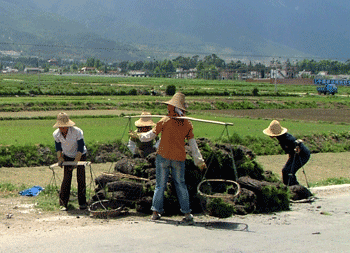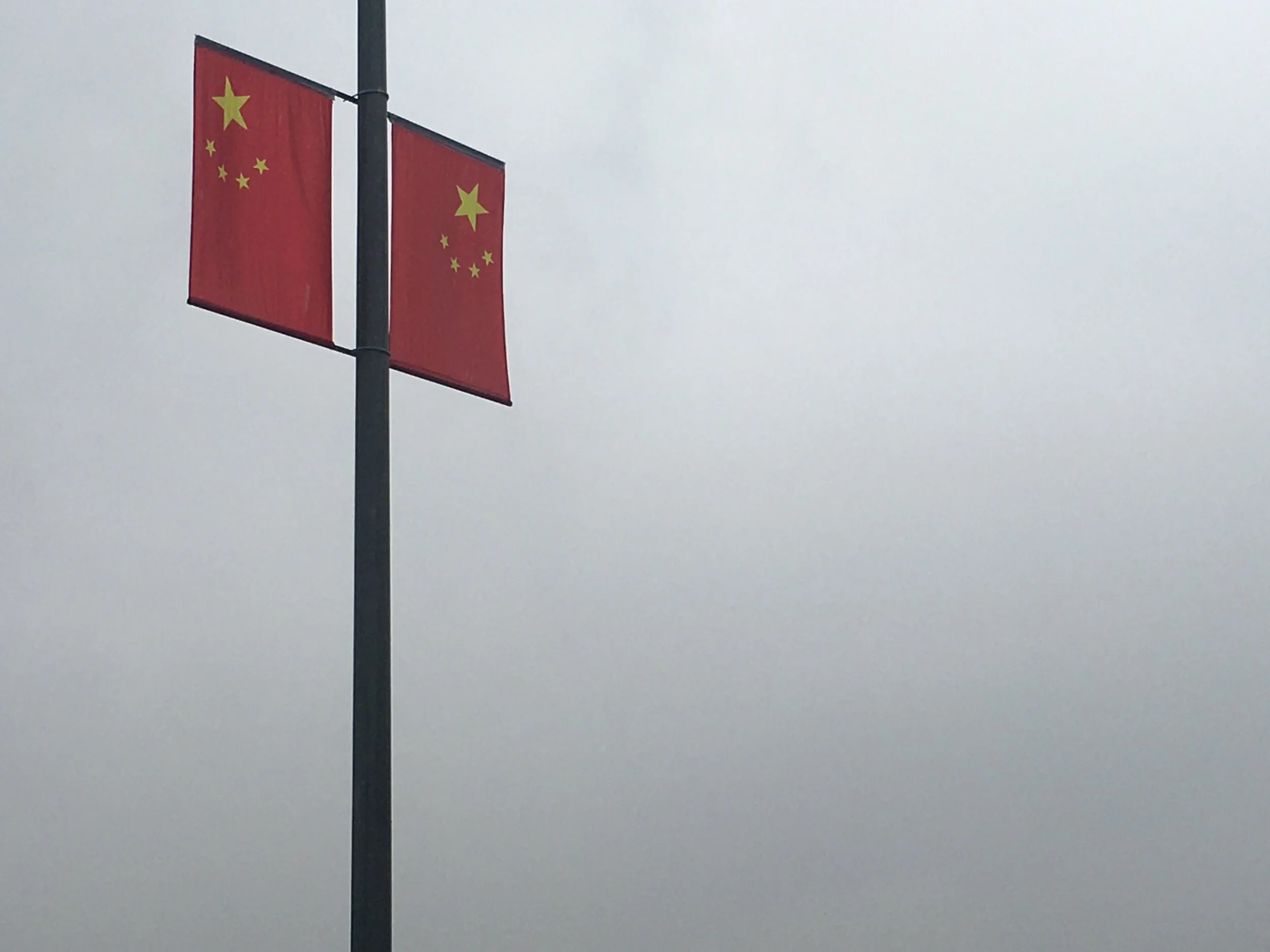Opening the Deep Temple
December 31, 2004
If alcoholism is the next step after journalism, then the logical career move for the alcoholic journalist is to open a bar.
THIS WEEK, Running Dog returned to his old haunt of Jinghong, the capital of the Xishuangbanna Autonomous Prefecture, near the border between Yunnan and Burma. The purpose, apart from escaping temporarily from the bitter and uninsulated Shanghai Winter, was to oversee the opening of a new bar. And so, the blue skies beamed over the Mekong, and in an obscure corner of the city, an incongruous little sliver of Shanghai sophistication was being launched betwixt a two-star hotel and a small tea house.
Cynical locals advised us to offer friendly girls, or karaoke. They said we would be closed within half a year. Local tastes, after all, were simple. Monks in orange robes played old-fashioned coin-ops on their nights off. Kids lounged on pavements. Cheap hookers strolled around Peacock Park carrying parasols.
This wouldn't be easy, and the whole venture – it seems – has been built on the promise that things are looking up for a minor provincial city with a population of less than half a million, a tiny airport and no train station. After negotiating the various bureaucratic and logistical challenges over the past month, Mr. and Mrs. Dog were finally in a position to open the doors on Christmas Day.
Xishuangbanna is different from other more accessible tourist zones in Yunnan. Despite a false start in the late 1990s - known locally as the 'tourist bubble' and leaving in its wake a glut of underemployed and embittered tour-guides - the region still hasn't been able to take full advantage of its position as the closest thing Chinese tourists can get to Thailand without having to apply for a visa (or, as Chinese tour companies are now unconscionably advising, without having to face the sort of natural disaster that has struck so obscenely this week). It is also the customary point of entry into China for the hordes of grubby trekkers making their way to the doped-up delights of Dali or the mystique of what is now (risibly) known as Shangrila in the north of the Province.
Unlike Dali, there are no stalls layered with kitsch, no crowds of ethnic minority traders drawn magnetically to the umpteen tour groups in town and grabbing at every sleeve, poking brochures in every face, offering marijuana or even opium to every bedraggled western hippy that passes by.
This, some tourists tell us, is one of the charms of Jinghong, but, as ever, there are trade-offs. Unlike Dali, which is not so much preserving its past but rebuilding it in an idealized form, much of Jinghong consists of breeze-blocks and corrugated iron. It is hard to tell which buildings are half-built and which are half-demolished. And as usual, if you asked the locals if they wanted to build a tourist trap or maintain their old impecunious traditions, they would certainly choose to take advantage of the influx and flog their jade trinkets to foreigners, rather than to each other.
The city certainly has its virtues. Like the rest of southeast Asia, it is warm all year round. Exotic butterflies dance in the soggy glade. Palm trees line each road, with clusters of grapes secreted in the folds of the trunks. It also boasts the uncommon mystique of the Mekong, a murky silt-filled affair for much of the year, but strangely packed with significance. A promenade along the riverside is just waiting for development.
Jinghong is a sleepy urban backwater surrounded on all sides by ethnic curiosities. A few cafes and guest houses have clustered around a junction in the centre of the city, an area flagged up by the Lonely Planet guidebooks. Our bar, unfortunately, lies beyond that purview. Our mission was to get noticed. After that, things ought to take care of themselves.
For the ragbag of foreign residents in the city – which consists of no more than a dozen hippy misfits and idealists, drop-outs and burn-outs, chancers and obsessives - boredom quickly seems to set in. For the locals, there is a relaxed, even somnolent air – fat men cling to motorbikes, young women soar past on tiny motorized scooters, wizened men in pointed hats pedal vigorously on old three-wheelers dedicated to collecting garbage. The women seem shorter and thicker than the rest of China, and the men are generally scorched to a deep ochre and wear shiny old cadre shirts and shoes with tassels. When it is hot, they fold up their shirts to reveal their bellies. If they are selling something, the sight of customers never distracts them from their cards, their mah-jong tiles.
The Jinghong nightlife, apart from the girls at Peacock Park, consists almost exclusively of great gawdy nightclubs. DJs shout, 'I want to hear you say yes!' Girls leap onto the tables. Men knock back beers and baijius. It reminds one of a night-out in Scunthorpe in 1981.
The principle behind Running Dog's decision to invest in a bar in the area was the sense that the region was going to grow explosively over the next few years. Much of this is centred around the knowledge, hyped up by the local and international press and uttered as a point of faith by local business people, that a highway stretching from Kunming all the way to Singapore was in the process of being built, and that Xishuangbanna would suddenly find itself in the middle of a wave of border crossings and border trade.
Things do seem certain to change. That narrow winding roads on which many of the local farmers depend, cutting through or alongside the semi-tropical forests full of vines and stranglers and snakes, will become superfluous for the freight traffic soaring into southeast Asia from Kunming and beyond. A city run at a painfully slow pace is likely to be brought up to speed by opportunist migrants from Sichuan and the northeast. The urban sprawl will… well.. sprawl still further, and the region's wild bursts of nature will be contained and constrained, lined with paths and villas and sundry entertainment facilities.
'Things are looking up,' said one local bureaucrat on our second night of business while glugging his fifth can of Tsingtao. 'The road will be built soon.'
The whole city rests on that hope. On a stretch of road which currently extends from Kunming only as far as the city of Simao in the north and then peters out into a 100km trail of half-built stanchions and scaffolds. Traffic snarls up in the narrow trails connecting the city of Jinghong with the rest of the country. Trucks occasionally block all passage. The road dips and breaks and crumbles. Workers line the road and pour buckets of gravel onto the crumbling ground.
In Yunnan, you are forced to think about such issues. You watch as local laborers lug slabs up the hills in order lay the paths for the tourists. You see teams of them, miscellaneously dressed and technologically backward, chopping away at rocks. Most of all, you see the communities cut off from the rest of the country. Aspirationally connected through the joys of electricity and - more crucially - TV, their advance is blocked by a crucial, objective fact. They cannot get anywhere. Aspiration is not supported by transportation.
And it affects tourism too. Of course, the more adventurous backpacker prefers to slog along mudtracks for three days before emerging into what he regards as a lost civilization, and there is plenty to keep him happy in Xishuangbanna. But for the less ambitious, it isn't quite so amenable. To visit the ethnic villages clustered around the city, you hire a local van and crawl through puddles, align the wheels between the ruts, and ask your passengers to cling on to anything they can in order to avoid being flung out of their seats. Around you are oxen, primitive diesel tractors, motorcycles sometimes smuggled – at great personal risk – across the border. You sense the quaintness of local custom, naturally, but desperation is not far behind. Look behind the rituals and see the filthy local child-beggars and the peasant junkies. Preservation is not the be-all and end-all.






